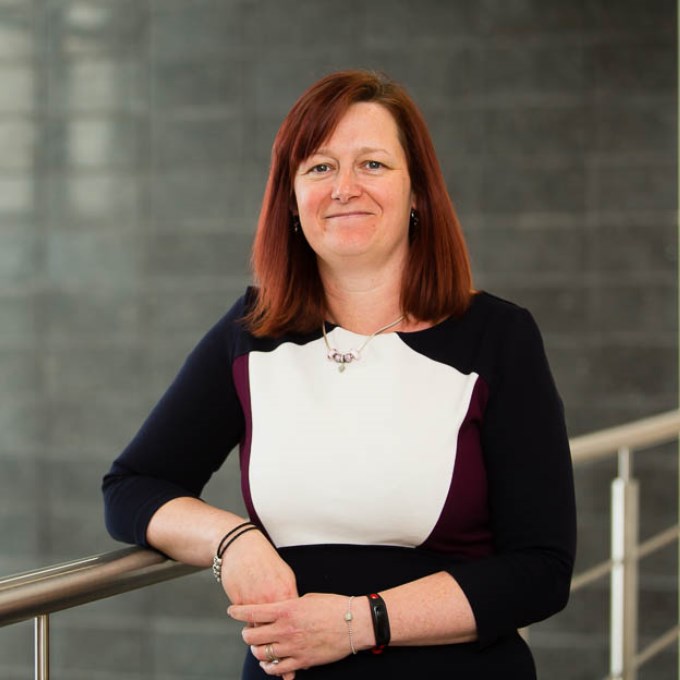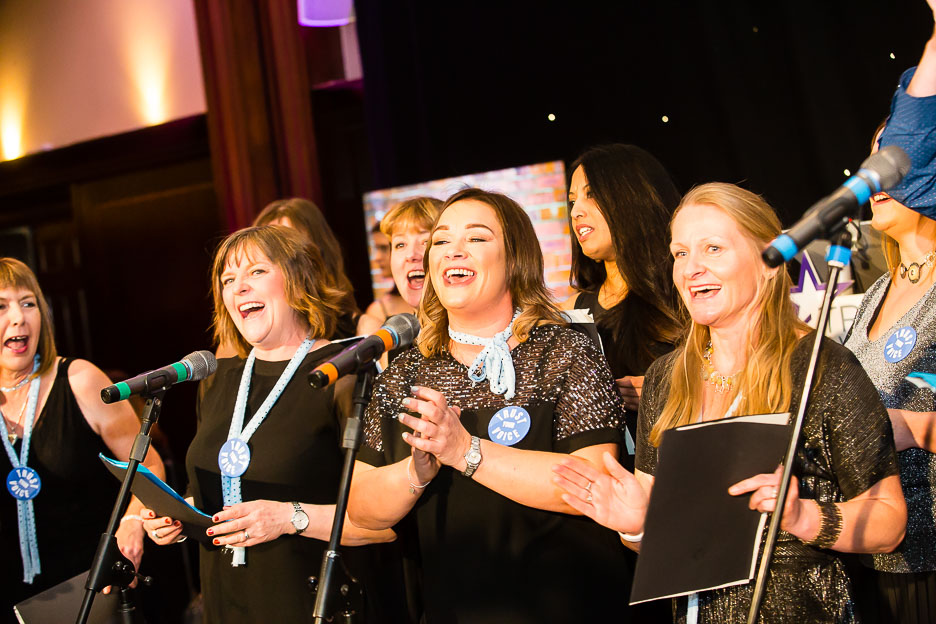Sara's blog for November 2019
Here’s our Chief Exec Dr Sara Munro’s blog for November 2019.
 Hello and welcome to my blog for December. I publish this blog every two months just before we have our public Trust Board meeting.
Hello and welcome to my blog for December. I publish this blog every two months just before we have our public Trust Board meeting.
I can’t quite believe it’s nearly Christmas as I prepare for the final Trust Board meeting of 2019. I’ll be blogging again before Christmas so this won’t be the last time you’ll hear from me this year!
There’s a lot to share since my last blog in October. As usual I’ve been privileged to spend time with some of our services over the last two months – here are the highlights.
NHS Northern Gambling Service
I’ve spent an afternoon with our new Northern Gambling Service (NGS) – observing their team meeting where they discuss treatment plans for recent referrals. There was a strong sense of team working and the staff fed back the benefit they had felt from a thorough development programme that had been put in place before the service went live. Partnership working across lots of different types of organisations featured heavily.
The NGS will be expanding their team and opening two new bases in Manchester and Sunderland in January which everyone is looking forward to.
Older Adults Community Services
I met with the senior leads for the older adults’ service who shared the work they have done since the new dedicated service went live in March 2019. Recruitment and workforce pressures are a real challenge, and they are trying to develop their team and run a busy service at the same time. However what is clear is the sense of pride and ambition in developing a specialist service for older adults and there is strong leadership in place to take this forward.
Listening to our staff
At the time of writing we are in the middle of our second big online conversation about improving culture at the Trust as well as encouraging staff to complete their staff survey.
I know that staff may feel a little surveyed out right now, but I promise that all this listening will result in real positive change. Our new Culture Collaborative will come back together in early January to consider the results of the online conversations before we have some face-to-face workshops in February and March. After that, we’ll make some firm decisions on things we want to focus on.
The importance of carers
Thursday 21 November was Carers Rights Day 2019. It brought organisations together to help carers in their local community know their rights and find out how to get the help and support they are entitled to. As a senior NHS leader, I was asked to make a pledge. So, here it is:
Carers provide essential support to some of our most vulnerable residents. Evidence shows that not only is the number of carers increasing, but they are taking on more and more responsibility. This has an impact upon carers’ physical, mental and economic health and wellbeing.
To help better support carers in Leeds, a new Carers Strategy is currently being developed, which aims to put carers at the heart of everything we do.
Interested in holding me and my colleagues to account? Here’s your chance!
In January 2020 we’re holding elections to our Council of Governors and we’re looking for service users, carers, staff and the general public who are interested in making a difference. Being a Governor means you can:
- Have your say about local mental health and learning disability services
- Influence who’s on the Trust’s Board
- Meet some great people and truly make a difference, and
- Act as an ambassador for our Trust.
Anyone who is a member of the Trust can stand for election as a Governor. We are particularly keen to hear from staff as we have two seats available for clinical staff Governors. Staff will be contacted via email on Monday 6 January 2020 with details on they can put themselves forward.
The Leeds health system – what’s been going on?
Members of the Partnership Executive Group and Leeds Academic Health Partnership Group attended a joint session with counterparts from the Bradford health and care system on 15 November.
The focus was on innovation and research and what we can learn and what we can do together. The Bradford presentations focused heavily on the ground breaking work of Born in Bradford which is tracking children and families, as well as bringing together data from genetics, health, care and the education system. Leeds is exploring a similar approach entitled ‘Living in Leeds’ but it’s early days at the moment.
Carers, women and mental health strategy discussed at Leeds Health and Wellbeing Board (HWBB) workshop
We received three presentations at this workshop in October.
The first was on supporting carers in our own workforce with a powerful story shared of how challenging it is to juggle paid work alongside caring responsibilities (see my carers pledge video above). This is something we have been discussing in our own organisation and, through the West Yorkshire health system, a working carers passport has been developed which our collective Directors of Workforce have agreed to take forward.
The second presentation was on the ‘Women Friendly Leeds’ initiative which is one of nine international projects that will run over the next four years. This is in the early stages so was a good opportunity to share ideas and views on where we would want to see an impact in the city. This included discussions around mental health, domestic violence, caring roles and the impact of poverty on women and children. I’ll give regular updates on the initiative as it develops.
The third focus of the workshop was on the draft mental health strategy for the city which is being led by health and social care. It focused on addressing inequalities in access and outcomes for different cultural groups. The work to date on the strategy was welcomed, but it needs to be strengthened around:
- children’s strategy and perinatal mental health
- meeting the needs of people with severe and enduring mental health problems
- access to specialist provision within Leeds
- the role of the integrated commissioning strategy for the city
- connectivity to and involvement of the workforce, and
- having clear and measurable outcomes.
The strategy remains in draft with further work and engagement to take place over the next few months.
Across West Yorkshire – what’s been going on?
We’ve put a small virtual team in place to finalise the work on governance for each of the new care models in the West Yorkshire mental health collaborative. These new care models are for adult eating disorders, CAMHS and forensics. This includes accountability and responsibility of boards, quality assurance and contract management and risk sharing agreements. The aim is to have a consistent framework for all three and the directors of finance are leading the work on principles underpinning risk sharing agreements.
As the submission for adult eating disorders is the first one, this has formed the basis for developing all three. We are on schedule to submit the final business case for adult eating disorders with final approval being sought at Finance and Performance prior to our Board meeting.
Reasons to be proud

We celebrated with hundreds of staff, volunteers and service users at our annual Trust Awards on 9 November. It was a glittering and buoyant night where we celebrated many reasons to be proud.
There were 160 nominations across 11 categories including a new Equality and Inclusion award. Guests were serenaded into the room by our new staff choir ‘Trust Your Voice’ (pictured here) before comedy compere Justin Moorhouse took to the stage in a room buzzing with excitement.
Well done to all the winners, runners up and everyone who was nominated. Check out all the winners on our website here.
Overwhelming positive feedback from Health Education England (HEE) Quality Review
In September HEE carried out a positive practice review of the education and training provision within the Trust to undergraduates in all professional disciplines. The visit was coordinated by our leads for professional training Dr Sharon Nightingale, Adam Maher and Linda Rose.
The formal report from the visit gives overwhelmingly positive feedback for the team in the learning environment and opportunities they put in place for all our trainees. We have a fantastic team in the Trust and the impact they are having on the current and future professional workforce deserves our recognition and thanks. Dr Abs Chakrabarti was mentioned specifically in the feedback for commendation in the support and leadership he provides to medical trainees.
The report also highlights a number of areas for best practice including culture, induction and rotas.
Personality Disorders’ double bill in Yorkshire Evening Post Awards
Stephanie Smith and Paul Butler, Care Coordinators in our Specialist Personality Disorder Services, have been nominated by service users in the Mental Health and Wellbeing category of this year’s Yorkshire Evening Post Health Awards. They were cited for their compassionate and high quality care and should be feeling very proud of their wonderful achievement. The awards night is on 6 December.
Publication success in Forensic Services
Well done to Dr Kerry Hinsby (Consultant Clinical Psychologist), Clare Layton (Matron) and colleagues who’ve had an article published in the latest edition of the International Institute of Organisational Psychological Medicine.
‘Developing and Embedding a Trauma Informed Clinical Model within a Forensic Service’ shares the work the service has done in developing and implementing a new clinical model which has underpinned their improvement journey over the past two years.
Poster prize win for work to support international medical graduates
Our psychiatrists Drs Shailik, Munniyapl, Mussabir, Aganren and Hashmi won the poster prize at the annual Higher Education England Yorkshire School of Psychiatry Conference in November.
The poster summaries an important piece of work recognising non UK medical graduates are disproportionately represented in issues of complaints and sanctions regarding medical practice when compared to UK graduates.
These issues are not dissimilar to the experiences of Black and Minority Ethnic (BAME) staff across all disciplines in the NHS. Dr Shailik and colleagues are attempting to address this through the provision of a bespoke induction and support to international medical graduates to better equip them in working in the UK health system.
Feedback and evaluation has been extremely positive and the programme is open now across to all international medical graduates in West Yorkshire. This work was also identified as an area of best practice in the visit by HEE.